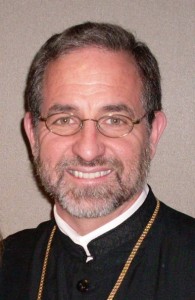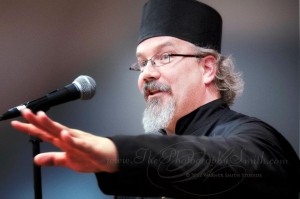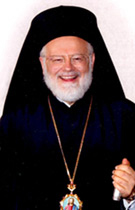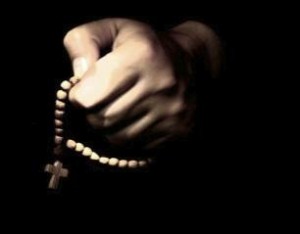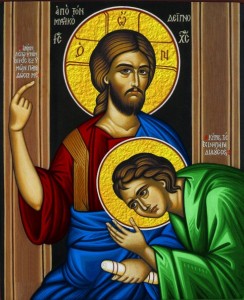Over the past few months, I have been involved in discussions about the moral decay of our present day society. Now I know the argument, some will say that there is no moral decay only an updating of where we are as a society, that is an opinion but not one that I hold. Our society has changed and not always for the better.
Now, I can only speak from experience from an Orthodox perspective, the faith that I believe is the true and right belief, and others may disagree. It has been said that the church needs to keep up with the times. The Church needs to modernize in order to keep the young people involved in the church. I find this a very disturbing statement. The goal of the church is not to change with society, or to be influenced by culture, the role of the church has always been to transform the culture and to be the moral compass that community so desperately needs.
The problem as I see it is that many of us who preach the Gospel have lost the way, or at least been side tracked by many things. In a recent podcast on Ancient Faith Radio, Fr. John Parker spoke of the need for us to return to preaching the Gospel of Jesus Christ. I have to agree. It is extremely easy to seek to avoid certain difficult topics when we preach, but it is our responsibility to preach and to teach. I have often said it is my duty as a priest to make you uncomfortable, to force you if necessary, to move from where you are to where you need to be. The entire life of a Christian is movement and growth, and in order for us to do that we need to be challenged. Living the life of a Christian is extraordinarily difficult in this world of ours, but we have to push ahead and do just that.
In the early history of the United States, there existed different periods referred to by historians as an awakening. These were times, largely in the Protestant denominations, were interest was renewed or awakened in people. What is commonly known as the 1st Great Awakening, preachers like Jonathan Edwards and George Whitfield changed the way they preached. Until this point, most preachers read their sermons and were more concerned with reaching people on an intellectual level. Edwards and Whitfield began to reach people on an emotional level. The historian Joseph Tracy in his book The Great Awakening saw this movement as the beginning of democratic thought in America and had a pivotal role in the American Revolution and led to what we now know and cherish as Freedom of Religion in America.
The late 18th Century saw that start of the period of the 2nd Great Awakening and led to the temperance movement but also to the abolitionist movement and the struggle for women’s suffrage. The period of 1850 to 1910 saw the 3rd Great Awakening that saw the introduction of the Social Gospel and churches getting back in touch with their missionary zeal and working directly with those less fortunate in their own communities. The YMCA was born out of this movement and helped the country return to normalcy after the Civil War.
The common thread in all of these “awakenings” was a return to basic biblical values the values that the church, and society, held dear for generations. What I am advocating is just that, a return to biblical values and a biblical sense of ethics and morality.
It begins with those of us who lead communities. We have a responsibility to teach the people what the Church believes and teaches. Not our interpretation of that, but what the Church teaches and holds dear. It will not always be comfortable, but it has to be done. We need to emphasize a return to the Sacrament of Reconciliation. Confession is a beautiful gift that the church has, and people need to avail themselves of this Sacrament on a more regular basis. This has to be more than just the annual check in during Holy Week, this needs to be a complete examination of conscious that comes from and knowledge of sin and grace and how it operates in our lives. Priests need to have regular scheduled times for confession. It is not enough to have confessions by appointment; we need to be available to parishioners for them to confess. It is hard enough for people to come to confession let’s not make it any more difficult.
We need to preach the love and acceptance of the Jesus Christ, not acceptance of inappropriate behavior, but acceptance of people as living Icons of Christ, we need to love them and show them the path to get their lives back on track. This needs to be done one person at a time. We priests need to spend time talking to people, listening to their life stories and helping them with their hurts, their fears, and their desires and we need to do this with love and compassion. This is what Jesus did, He sat with people and listened, corrected when necessary, but He did it all with love.
People need to develop a prayer life that will help protect them in this world we live in. Prayer is a shield that will protect us in battle, and make no mistake about it, we are in a battle. In the same podcast, I mentioned before, Fr. John advises that we serve all of the Church services that we can. We have to do more than just Liturgy on Sunday. We need Vespers, Orthros, Akathists, and other services of supplication. We need to celebrate feast days whether with full Liturgies or Vespers the night before. We need to celebrate these services in the best possible way we can. If we do not have the resources to do this, then we need to work with the other Orthodox Churches, regardless of jurisdiction, and serve these services together. We so desperately need a revival of parish life in America, and it will start with serving liturgies and encouraging participation of the faithful in these liturgies. Priests pray for your parishioners and parishioners pray for your priests.
The other part of this is holding people accountable, and by this I mean all people. Those of us who are leaders, Bishops, Priests, Deacons needs to held accountable for our actions. We are held to a higher standard than lay people are. This is a difficult cross to bear, but we knew this going in. Each time a Bishop, Priest or a Deacon falls it is very public, and it harms the body of Christ. Yes we are human, and I believe we come under attack in much greater ways than lay people, but we need to rise above it and we do this through prayer and by having an authentic spiritual father that holds us accountable. We need to return to the Sacrament of reconciliation, and I count myself in that as well, we need to hold each other accountable and reach out and help our brothers when they stumble. Our lives are highly public, more so with the advent of Social Media if you are not willing to live in a fish bowl then maybe it is time for you to find another occupation. This will sound harsh, but any Bishop, Priest, or Deacon that is found guilty of a sexual crime or any crime for that matter, needs to never serve in public ministry again! I believe in forgiveness and reconciliation, but when it comes to crimes I have to draw the line. Again we are held to a much higher standard than lay people, and we as leaders need to stop covering this up, we need to reach out and support our brothers, but we also need to be the ones who police ourselves and put an end to this. The faithful look to us to lead them and we cannot lead them if we are compromised. Do not be afraid to reach out and ask for help if you need it.
About a year ago, the priests in my area started to meet for breakfast once a month. I so look forward to this time, and I strive to let nothing get in the way of meeting with my brothers. We have a wide range of ages and experience in our clergy here, and we all learn from and support each other. I would like to see this group expand past the monthly breakfast and to hold a retreat day or perhaps an overnight retreat, a time for us to go away as Jesus did, and pray and just be. If you do not have a clergy group where you are start one. Call the clergy in your area and meet for breakfast or lunch or something. Just gather together to socialize. The same holds true for your wives. Clergy wives have a unique ministry, and they need support as well. We need more work in this area.
In order for this to happen we need to be more selective in whom we ordain. Just because, a man presents himself for ordination, or just because he has graduated from seminary does not mean he should be ordained. Candidates for ordination need to be screened not only spiritually but medically and psychologically. Being a priest in America today is an intensely stressful vocation. We are under paid and over worked. Many priests have to work secular jobs to support their families due to the poor financial situation of many of our parishes. Putting a man under stress will bring our weaknesses in him that maybe is not known. We need highly trained and genuine spiritual fathers in the Church today. I cannot emphasize enough how crucial the role of a spiritual father is in the life of, not only those to be ordained, but in the lives of all the faithful. Authentic spiritual fathers need to be identified and used more than they are today. Associated with that is the building up and support of monasteries here in America. We have some incredible, spiritual monasteries for both men and women, but we need many more. With the exception of what we are trying to develop here, there is not one monastery in all of New England. The closest monastery of any jurisdiction is four hours away, and that needs to change.
We leaders also need to hold those we are leading accountable. Bishops, Priests, and Deacons need to hold people accountable for their actions and their words. If we see an Orthodox Christian writing, preaching, or teaching things that are against the faith of the Church we need to speak out. We need to hold those who hold public office to account for their votes. If they claim to be Orthodox Christians than their voting record needs to demonstrate that. Those of us, who lead, in the Church our out of the Church, need to be the examples to those we lead. If we cannot do that then step down from the leadership position. If we stray then we need to be given the opportunity to be restored. We cannot just throw people out. The Church is the hospital for the soul, and we need to make this available to all who need it. If a priest falls we need to help him anyway we can to come to an understanding of what he has done, we need to give him and his family the assistance he may need, and if possible, restored to ministry. We are all broken, lay and clergy alike, and we all need that support and love of Christ and his Church.
Being a Christian has always been counter cultural. Christians have always been called to go against the flow, to walk the narrow path, and Jesus told us that the world would hate us for it, but this is what we are called to be and to do.
How do we revitalize the morals of society, by renewing them in us first. We have to be the ones who make the change, we have to be the ones who find that peace that the Church has to offer, and we need to be the ones who do the work. We, Orthodox Christians, need to model for the rest of the world how we should act and how we should live. We need to shower the love of Christ upon everyone we meet, we need to return to the authentic teachings of the Church and understand them and put them into practice in our own lives. We need to be the ones who lead the next Great Awakening in our country, and we need to do it now!





